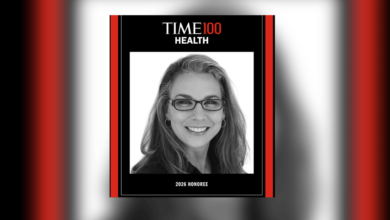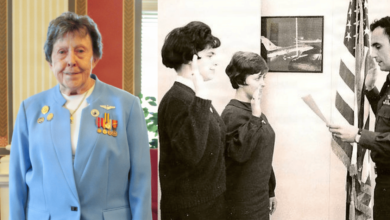Nurses welcome technology but warn again ‘silver bullet’ thinking

Artificial intelligence (AI), robotics and other types of technology are being increasingly leaned upon to provide answers to challenges in nursing.
The NHS owes a lot to tech; its 75th anniversary saw the spotlight shone on time- and life-saving innovations across its history, from heart monitors and digital patient records to dialysis machines and surgical robotics.
“The main problems [we encounter] day to day can’t be resolved by this kind of technology”
Meg Garvey
Looking ahead, the recently published NHS Long Term Workforce Plan included a whole host of proposals for how AI could be used for diagnostic support, administrative automation and drug discovery.
It said trials of AI products were underway in more than 400 NHS settings and showing “promising results; for example, in lung cancer screening, stroke, [chronic obstructive pulmonary disease] and dermatology pathways”.
The plan mentioned how AI could increase productivity and give the workforce the “gift of time”. Meanwhile, further automation is already being seen on the shop floor: one NHS trust is trialling the use of robotic “helpers” resembling penguins which can be used for moving medicine, specimens and other clinical supplies.
As the long-spoken-about digital revolution of the NHS moves forward, nurses and nursing leaders have made clear that tech cannot be viewed as a “silver bullet” for the problems facing the health service.
Meg Garvey, a nurse practising in the South of England, said tech solutions to tasks such as medicine dispensary were useful for nursing staff, but that robotics and AI were not chiefly what the profession is crying out for.

Megan Garvey, registered nurse
She said: “The main problems [we encounter] day to day can’t be resolved by this kind of technology. I have patients waiting days for surgery, and whilst [tech] can help with complex cases, [it] won’t fix the lack of anaesthetists, surgeons and nurses.”
The NHS workforce plan’s passage on how tech will be used to alleviate ongoing pressures and problems suggested that generative AI – such as the widely publicised chatbot ChatGPT – could “support” NHS staff in future.
However, Ms Garvey said she was concerned that AI was being seen as the NHS’s “saviour”. She warned: “These new and interesting technologies can make massive medical advancements and help make lives slightly easier, but they don’t reduce the pressure for new beds.”
Similarly, Lea Heaton, an A&E nurse from the West Midlands, said the government and NHS’s futuristic plans for AI, robotics and other tech should not be the priority until other fundamental problems were addressed.

Registered nurse Lea Heaton
She explained that her NHS trust had, only in the last few years, begun transitioning from a paper to digital note system for nursing staff, and that electronic prescribing was relatively new. In her trust, this transition had not been without teething problems, and digital infrastructure was lacking.
“It’s just not there yet,” she said. “We still have people in my trust, and in others, fighting for working computers to do documentation. In some places paper is still being used. We routinely don’t have enough pillows for patients, and we ran out of linin recently.
“That is of course a trust-specific issue, but it feels like we’re not focusing on the right thing. It is what makes this robotic penguin, for example, ridiculous to me. It appears like a project for [the government] to just say – ‘Oh look what we’re doing’. When there are so many other problems.”
At the same time, Ms Heaton recognised the positive potential of tech, such as the AutoPulse machine in her unit, which is placed onto a patient’s chest and provides automated cardiopulmonary resuscitation (CPR).
“In A&E, we have machines such as an AutoPulse, which is life changing for people, but I can’t think of much that humans can’t do. Digitisation is a massive one which really helps and I can see [AI] being used for prescribing, making it easier and safer to give medications, alongside the double checks which are already there,” she said.
Healthcare academic and former registered nurse, Dr Elaine Maxwell, said any tech solution sold as a replacement for time spent by a nursing professional was potentially “dangerous”.
She said: “We [already] have a lot of AI in systems now, for example cardiac monitors and pretty much any electrocardiogram (ECG). This is not new, but the challenge of how it is used is. It is being spoken about like it is a replacement for professionals.
“AI works from known knowns; it doesn’t know the unknown unknowns… a nurse can use their professional judgment to deal with the unexpected.”
Dr Maxwell, who is a visiting professor at Anglo-European College of Chiropractic (AECC) University College in Bournemouth, said the administration of medicines using automated systems must be considered very carefully. “Giving an ill patient their medication in hospital needs professional judgement, not just chucking it at them,” she said. “There is a whole load of complexity of some of these tasks which isn’t recognised [by government]. Robotics might assist, but for some patients I would want to assess when they take it.”
Dr Maxwell said the potential for AI, robotics and other tech was “huge”. But, she warned, robots should not be perceived as a replacement for investment in a professional workforce. Rather than advocate for luddism, Dr Maxwell was optimistic AI assistance could help nurses, but that the profession must be actively involved in its introduction.
“Nurses should embrace it,” she said. “But they should make sure they’re an active part of it. I think it’s a lack of understanding of the complexity of nursing. If nurses don’t explain it, then it’s no surprise that non-nurses don’t understand it, and Steve Barclay doesn’t.
“So, nurses need to get on the front foot and embrace all forms of tech, robotics and AI. But be clear about how it should be used, the limitations and how to use it safely.”
Dr Maxwell called for a new nursing strategy on AI going forward.

Dr Elaine Maxwell
This not a discussion unique to the UK. Gerard Brogan, director of nursing practice for California Nurses Association (CSA), a nursing union in the US, said hospital chief executives there were using tech as an excuse for not properly addressing workforce needs.
“They’re just piling in,” he said. “There is a thrall of technology. It’s almost like it’s seduced everybody, like technology is going to solve every single problem. We’re not anti-technology, of course, we’re not going to go around breaking machines, but nursing ever since its inception in the 1800s has taken a holistic approach. [This] is the anathema to the AI approach, which is data driven. Everything’s an abstract.”
Mr Brogan said a close eye should be kept on the use of tech in nursing. One company, based in the US, recently began marketing robot helpers – similar to those trialled in the UK – as a solution to “the nursing shortage”. Mr Brogan said: “We don’t have a nursing shortage, we have a staffing crisis. We have 4.4 million registered nurses, but only 3.3 million are working. We need to change the way nurses are treated; Retainment and recruitment are the things the industry should be focused on.”
He called some of the tech solutions, such as these helper robots, “absurd”, adding: “It will go get stuff from the pharmacy. It takes two minutes to go to pharmacy, that’s not [the] big issue.”
Mr Brogan said some tech solutions could actively harm or degrade the profession, such as emerging proposals in the US for “virtual nursing”. He criticised one scheme allowing nurses to work from home, instructing non-registered healthcare staff to administer care.
Back in the UK, some nurses are already seeing changes in their workplace. Like others, Royal College of Nursing (RCN) head of nursing practice Wendy Preston said she could see the benefits – but concerns linger about over-excitement on display from policymakers about AI and robotics.
Ms Preston said AI and robotics “can be no substitute” for investment in workforce, reiterating her union’s push for more funding towards nursing staff numbers and describing anything else as “a sticking plaster that will leave patients at continued risk”.
She said: “Robotics and AI have already shown their worth in health care demonstrating improved outcomes for patients in a number of areas, for example prostate cancer surgery. However, robotics and AI are not a silver bullet that can fix the growing crisis in the NHS.”






